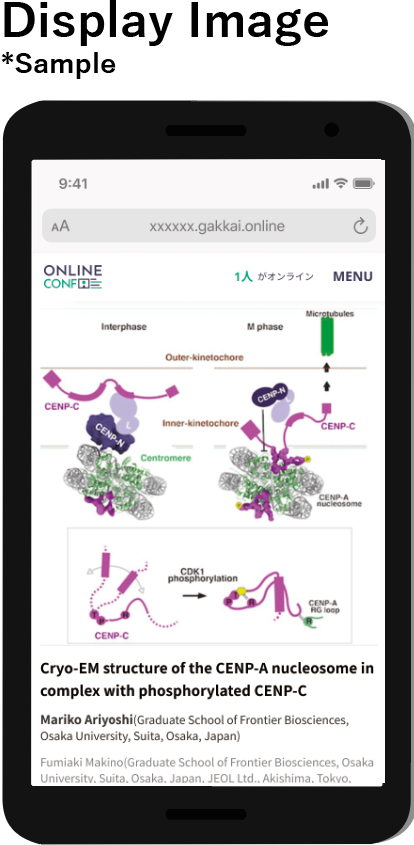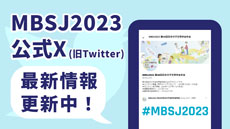Abstract Submission
Abstract Submission
July 3 (Mon) – July 31 (Mon) JST17:00, 2023 Closed
* Abstract submission must be completed by 17:00 JST on July 31 (Mon).
Please note that after 17:00, you cannot submit or edit your abstract even if you are still logged in the system. Please submit your abstract well in advance.
* Late-breaking Abstract submission will be accepted in September, but presentation style for LBA is poster only.
* Late-breaking Abstracts are NOT selected for oral presentation at open-call symposia or science pitch (short talk).
Abstract Submission
Abstract submissions (poster presentations, oral presentations for open-call symposium, science pitch/short talks), as well as abstract submissions for invited speakers, will be accepted online.
You can access the abstract submission system by clicking on the button located at the bottom of this page.
The abstract submission system is integrated with the registration system. Please refer to the following for a brief overview of the registration process.
Presentation Styles of Free Papers
・Poster presentation: All accepted abstracts
・Oral presentation at open-call symposia: Symposium organizers will select from applied abstracts.
・Science pitch (short talk): Review committee members will select from applied abstracts.(Only students and postdoctoral researchers are eligible to apply.)
*Poster presentations and science pitches are to be presented on-site. Online presentation will not be accepted.
*Abstracts accepted for open-call symposia to be held online should be presented as both online talk via Zoom and on-site poster presentation.
Character Limits
Title: 200 characters (not words)
Abstract body: 1,700 characters (not words)
Graphical abstract
All presenters of MBSJ2023 are required to submit a graphical abstract.
Please upload a data file of graphical abstract in the following format in addition to an abstract.
Size: 1200 x 1200 px
Font:Helvetica or Arial
Font Size:Larger than 12pt
Format: JPEG
File Size: Less than 1MB
*Presentation titles and presenters’ names will be automatically displayed in the online conference system, so there is no need to include them in the graphical abstract.
Graphical abstracts can be changed prior to the meeting.


【Requirements for Presenters of Free Papers (Poster/Oral presentation at Open-call Symposia /Science Pitch】
・Non-members of MBSJ can also submit abstracts for MBSJ2023 if they register as “Non-member with abstract submission”.
・If you are not a member but want to submit an abstract as member, please apply for a membership and complete the payment of annual membership fee in addition to the registration fee for the meeting.
・Please create a new account of the system and complete registration prior to abstract submission.
*New account must be created for each year’s annual meeting.
・Abstracts must be submitted by presenters. The name of the person who submitted an abstract will be automatically marked as the presenter in the online abstracts.
・You can submit more than one abstract for MBSJ2023. However, only one abstract per a presenter can be submitted for “Oral Presentation at Open-call Symposia” and “Science Pitch (short talk)”.
・Multiple abstracts can be submitted only if they are on different research topics.
*Posters submitted by the same presenter will be numbered consecutively on the same presentation date.
・For open-call symposium presentations, the language will be specified by each organizer, so when applying for an oral presentation in an open-call symposium, please submit the abstract in the language specified by the organizer.
・Submission or revision of abstracts are not accepted after the submission deadline.
Guidelines relating to presentation of research results
An important objective of the conference is to engage in lively debate and to exchange information by sharing the latest research results, including those that have not yet been published. In order to achieve this objective, we ask you to follow the guidelines set out below with respect to research presentations.
- The following behavior, which could seriously damage mutual trust among participants, is prohibited.
Capture/save (including screen capture), photographic, video or sound recording of raw data presented or displayed at the verbal presentation venue or the poster venue (including streaming) without the permission of the presenter.
Disclosure of the above research data to a third party via SNS or similar media without the permission of the presenter. - When making presentations, as far as possible, there should be no concealing of molecule names, methodologies, theoretical concepts or ideas that are central to the research.
- Presenters are to take responsibility for the handling of information relating to patent applications and the like.
- Presenters are required to disclose any conflict of interest in this meeting.
Adopted September 14, 2018
Molecular Biology Society of Japan, 20th Board of Directors
Partial Revision in Guideline 1, Addition in guideline 4 November 29, 2021
Molecular Biology Society of Japan, 22nd Board of Directors
Application for Free Papers
- Oral Presentation at Open-call Symposia
All open-call Symposia are calling for abstracts for presentation from free papers.
If you want to give a presentation at an open-call symposium, please choose one theme from the list of open-call symposia.
If you wish to give an oral presentation at any symposium in case your abstract is not accepted for the open-call symposium you applied for, please check the corresponding box in the abstract submission system.
After the review by the organizers of open-call symposia and the program committees, we will notify you of the result by e-mail in early mid to late September.
*Free papers selected for open-call symposia presentation must be presented as a poster, too. *Multiple abstract submissions are allowed, provided they are based on different research topics. *You can submit more than one abstract. However, only one abstract per a presenter can be submitted for “Oral Presentation at Open-call Symposia” and “Science Pitch (short talk)”.
Example)
*The table can be scrolled horizontally.Presentation Type Oral Presentation at
Open-call Symposium
*Only 1 abstract can be submitted.Science Pitch
*Only 1 abstract can be submitted.Poster Application Permission Example 1 Abstract A Abstract B Abstract C ○ Example 2 Abstract A Abstract A Abstract B ○ Example 3 ― ― Abstract A,
Abstract B○ Example 4 Abstract A,
Abstract B
*No multiple submission allowed.― Abstract C × Example 5 ― Abstract A,
Abstract B
*No multiple submission allowed.― × - Science Pitch (Short Talk) *Only students and postdoctoral researchers are eligible to apply
Science Pitch (Short Talk) session will be held during the first half of poster session (13:45 – 14:45) on each day.
If you want to apply for science pitch, please check the box in the abstract submission system.
*The abstracts accepted for science pitche will be assigned to the poster presentation in the second half of the session (14:45 – 15:45) on the same day.・Presentation time: 3 minutes
・Location: Special booth at poster venue
・Presentation slide: Up to 3 pages (PPT), No animation
・No Q&A time (3-minutes live presentation only)
・Only on-site presentation is accepted. Submitting a video file with audio is not acceptable.
* Instruction on submitting slides will be posted later.
*Only students and postdoctoral researchers are eligible to apply.
* If there are many applicants, abstracts may be selected.
* Only one abstract per a presenter can be submitted for “Oral Presentation at Open-call Symposia” and “Science Pitch (short talk)”. Please refer to the examples provided above.
- Science Pitch Award
Outstanding presentations of Science Pitch will be awarded.
・Selection Criteria: All abstracts presented in the Science Pitch session.
・Selection Method: Scoring by the panel of judges.
- Travel Grants for Early Career Researchers in Overseas
MBSJ2023 will provide travel grants for early career researchers residing overseas.
Please refer to the information page for details.
List of Topics
Please choose one topics from each category 1 and 2 during the submission procedure.
1.Object / Phenomenon, etc.
| Categories | Topics | ||
|---|---|---|---|
| 1 | Molecular | a | Genome / Gene / Nucleic Acid |
| b | DNA replication | ||
| c | Recombination / Mutation / Repair | ||
| d | Epigenetics / Chromatin | ||
| e | Transcription | ||
| f | RNA / Ribonucleoprotein | ||
| g | Translation | ||
| h | Protein | ||
| i | Carbohydrate / Lipid / Metabolite | ||
| j | Molecular Evolution / Comparative Genomics | ||
| k | Others | ||
| 2 | Cell | a | Chromosome / Nuclear Body |
| b | Phase Separation | ||
| c | Protein Processing / Transport / Localization | ||
| d | Cytoplasmic Membranous Organelle | ||
| e | Cell Adhesion / Cell Motility / Extracellular Matrix | ||
| f | Cell Membrane / Cytoskeleton | ||
| g | Cell Proliferation / Division / Cell Cycle | ||
| h | Signal Transduction (Post Translational Modification) | ||
| i | Signal Transduction (Bioactive Substance) | ||
| j | Cell Death | ||
| k | Others | ||
| 3 | Development and Regeneration | a | Organogenesis / Morphogenesis / Regeneration |
| b | Stem Cell | ||
| c | Cell Differentiation | ||
| d | Early Development | ||
| e | Reproduction | ||
| f | Others | ||
| 4 | Animal and Plant Physiology, and Diseases | a | Symbiotic Microorganism |
| b | Biological Rhythm | ||
| c | Brain / Nervous System / Neurodevelopment / Structure |
||
| d | Brain / Nervous System / Behavior | ||
| e | Brain / Nervous System / Disorder | ||
| f | Immunity | ||
| g | Infection / Virus | ||
| h | Aging | ||
| i | Cancer Cell | ||
| j | Cancer Tissue / Cancer Therapeutics | ||
| k | Metabolism / Nutrition | ||
| l | Genetic Disorder | ||
| m | Plant | ||
| n | Others | ||
2.Methods, etc.
| i | Nucleic Acid Engineering / Genome Editing |
| ii | Protein Engineering |
| iii | Genome Engineering / Cell Engineering |
| iv | Developmental Engineering / Organoid |
| v | Optgenetics / Electrophysiology |
| vi | Systems Biology / Synthetic Biology |
| vii | Chemical Biology |
| viii | Structural Biology (X-rays, Cryo-EM) |
| ix | Prediction of Function / Drug Design |
| x | Bioinformatics |
| xi | Omics Analysis |
| xii | Single Cell Analysis |
| xiii | Imaging |
| xiv | Super-resolution Imaging / Specialized Imaging Technology |
| xv | Image Analysis / Bioimage Informatics |
| xvi | Etiological Analysis / Diagnosis |
| xvii | Behavior Analysis |
| xviii | Screening |
| xix | Robotics / Laboratory Automation |
| xx | Deep Learning / Machine Learning |
| xxi | Mathematical Model / Simulation |
| xxii | Others |











